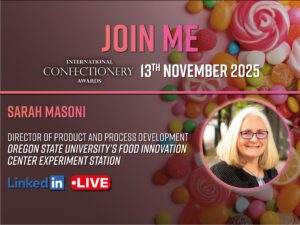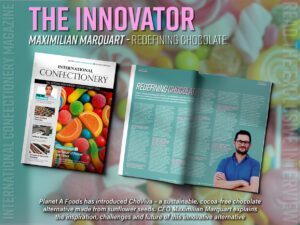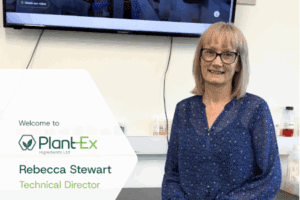Jeroen Gode, system Engineer and Bakery Expert at Syntegon, talks to International Confectionery about the company’s packaging capabilities and developments in the industry.
1/ How does Syntegon stay ahead of the curve?
Syntegon has decades of experience in engineering packaging systems. We carefully analyse the requirements of our customers to ensure they get a system tailored to their needs.
Syntegon provides bakery manufacturers with individual solutions – which is why we were able to maintain high market shares. At the same time, there is a constant need to respond to manufacturers’ demands. Receiving customer feedback is very important as it is ultimately them who have every-day working experience with the machines. Within customer relationships, Syntegon values exchange and discussion: If a customer needs a special feature, we try to find the optimal solution together and try to incorporate their experience into future designs.
2/ How do your machines stand out compared to your competitors’
One of the main strengths of Syntegon’s equipment lines is the modular design that allows for high flexibility to cater to a wide range of product and pack style variations. With this, we can respond to the manufacturer’s needs and provide a fitting solution, whether that is an entry level system, an efficient high-speed solution or anything in between.
Additionally, Syntegon is currently integrating the Internet of Things (IOT) into its machines. This means, that HMI operating systems for each line feature advanced monitoring capabilities. These were first unveiled at Interpack in 2017. The technology has been continuously developed to fit customers’ demands for even more user-friendly systems that enhance the efficiency for their individual production operations. Many Syntegon customers have been able to double their efficiency levels by optimising their production processes using HMI operating systems.
3/ How have your Pack-Series flow wrapping machines improved sealing quality?
Several updates were made to improve process efficiency and film control: For example, a servo-driven power feed roller was added to optimize film tension and tracking. The new fin seal unit consists of pressure-controlled fin wheels, that allow the easy adjustment of the machine when running a variety of products with different films. Due to the cut-out deckplates, each package now passes over the fin wheels more closely – yielding even tighter packages. Operators are now able to remove the fin fold-over unit without tools and have full access to the cutting head area for cleaning and maintenance, which increases OEE. The cross-seal unit, in turn, stands out due to its narrow cutting head, which operators can manually remove for cleaning and clearing using a hand wheel. Gusseted pack styles can be processed using air and fork gusseting. In a final step, the mechanically driven overhead roller tightens the packaging seals on the discharge belt station.
4/ How many products can be processed per line and how has your machine impacted the production environment?
Syntegon takes their customers’ products, packaging material and pack style into consideration when choosing the right solution. Industrial baking focuses on offering consumers the same product experience they get when buying from a small bakery around the corner. To make sure the products are packaged as freshly as possible, packaging equipment is usually integrated into the baking and cooling processing lines.
A major challenge for manufacturers of baked goods is to maintain the quality of packaged products and ensure they’re presentable. So, the handling and packaging equipment needs to handle and process the delicate bakery products accordingly, in order to keep the products crunchy and delicious throughout the whole manufacturing and supply chain.
This requires a stable packaging and production environment, as well as constant monitoring of the production processes. This concerns, the prevailing humidity and temperature levels in the machines since they directly influence the moisture levels and product temperature inside each pack – which could potentially impact the product quality. Baked goods require high standards in product protection and hygiene since they are very delicate and quickly perishable when contaminated with product residues. Syntegon’s machines provide hygienic designs with sloped surfaces and without dead corners that minimize the risk for contamination and offer optimal visibility and accessibility. Residues that cannot be seen will not be cleaned properly. Therefore, visibility in critical areas has a high priority to ensure efficient cleaning processes. Accessibility also plays an important role in cleaning and sanitizing production facilities.
Syntegon technologies, such as the Pack Feeder 5 or Pack 403, incorporate all of these solutions for optimal hygienic conditions in the production process. Both solutions offer crumb trays that can easily be exchanged during production. Also, all parts that could potentially be contaminated with product residue can be removed quickly without using tools – this ensures spotless machines. The surfaces are easy to clean, and the machines are designed in a way that prevents the accumulation of product residue and dirt. The machinery is robust enough to endure relevant cleaning methods.
5/ How have you made your machines efficient yet flexible?
The bakery industry faces a broad range of product variety, format range and pack style complexity. As a result, format flexibility and fast changeovers are key to an overall equipment effectiveness. In terms of wrapping equipment, the maximum film width defines the machine’s format range. For wrapping pizzas or large cake products, this often requires a film width of 700mm or more.
Robotic solutions, vision inspection systems and scalable, programmable feeding systems such as XTS linear motor technology, offer maximum flexibility and gentle handling. Automated changeovers minimize downtime and ensure vertical start-ups. Being able to adjust the entire system to the required speed differences – from the oven to the case packer – and to optimize all interfaces maximizes efficiency and reduces food waste.
Production rates and cleaning times depend on the products. Production varies around the world, influenced for example by baking traditions in different regions. These make the baking industry unique and require a holistic approach, combining hygienic design, cleaning methods and modifications of the packaging environment, such as MAP-solutions (Modified Atmosphere Packaging). These need to be considered in the early phases of the machine design – this makes sanitary design and accessibility an individual case with every manufacturer.
Robust and reliable machines are an important factor when it comes to efficiency. Reducing bottlenecks starts with the design of a system according to individual requirements. The system should enable production to be ramped up and down within the expected range. Micro-buffers also help to overcome bottlenecks. As automation becomes more important, robotic solutions are a key element, capable of handling even random product streams.
6/ Is Syntegon driving any new developments in the packaging sector?
Debates sustainability have been driving innovation in the baked goods industry. Syntegon embraces alternative packaging solutions since manufacturers and brand owners are increasingly concerned with packaging waste and looking for environmentally friendly packaging materials. To reduce packaging ecological impact, finding materials that consume fewer resources is important. Whenever possible in product protection, Syntegon recommends paper-based solutions. Latest barrier paper developments contain up to 90 percent paper fibres – they can be recycled in the paper waste stream in most countries and offer higher barrier protection. This also makes it a suitable option for many sticky or oily confectionery and baked goods.
For sensitive products, such as cakes or soft cookies, where paper is not an option and very high barriers are needed, mono-polyolefin plastic is a fully recyclable and therefore more sustainable packaging material. These mono-materials can be made from PE (Polyethlyen), PP (Polypropylen) or even a combined solution. From a recycling point of view, PE is the better option, but is more difficult to process. For this reason, manufacturers need to evaluate their expectations towards, for example, the look and feel of the packaging to determine the optimal solution for switching from conventional plastics to more environmentally friendly alternatives.
Paper and mono plastics are more sustainable, but also more difficult to run on existing machines. Paper is not very tear-resistant and insulates much more heat than plastic. Mono-materials challenge heat seal systems with inner and outer layers that melt at similar temperatures. Without technical adjustments of the equipment, these materials often require a reduction of speed and compromises on packaging quality. Syntegon is developing solutions that enable both existing and new machines to process sustainable materials with the highest efficiency and packaging quality possible.
For the paper packaging for products such as cupcakes or bars, one solution is the “paper-ON-form” retrofit kit for horizontal flow wrapping machines. It contains a flow-wrap forming unit and sealing jaws for paper cold- and heat-sealing applications. It allows for processing barrier papers without wrinkling or tearing, while the cold- and heat-sealing tools gently form the sealing seams. The “paper-ON-form” retrofit kit can be used for different types of paper as well as conventional materials. In terms of sealing technologies, Syntegon overcame the limitations of processing heat-sensitive mono-materials: The Amplified Heat-Sealing technology (AHS) combines the precise and flexible application of a box-motion sealing with the high speed of rotary sealing for fully recyclable polyolefin flow wraps, enabling a step-by-step transition towards more sustainable packaging.
Besides replacing plastic laminates in the form of flow wraps and vertical packaging formats, paper can also replace thermoformed plastic trays used to hold bakery goods and cookies in place and protect them from mechanical damage. Syntegon has developed the Kliklok ACE carton former for folded tray solutions without plastic and even without using glue – thanks to a special lock technology. The carton former can be integrated into existing packaging lines to replace plastic trays with cardboard.
7/ How integral are these trustful collaborations with companies, within the Bakery Industry, to Syntegon?? (such as Almarai)
A trustful collaboration between customer and machine manufacturer is key to reaching maximum efficiency on the lines: sharing expertise helps both sides to improve the technologies used. Intensive procedures such as leakage tests of the flow wraps for various baked goods yield the best possible output. Syntegon offers solutions tailored to the customer’s needs, providing reliable service and solutions like virtual remote support, which proves especially helpful in times of a global pandemic.
To stay up to date on the latest, trends, innovations, people news and company updates within the global confectionery market please register to receive our newsletter here
Media contact
Roshini Bains,
Editor, International Confectionery
Tel: +44 (0) 1622 823 922
Email: [email protected]









